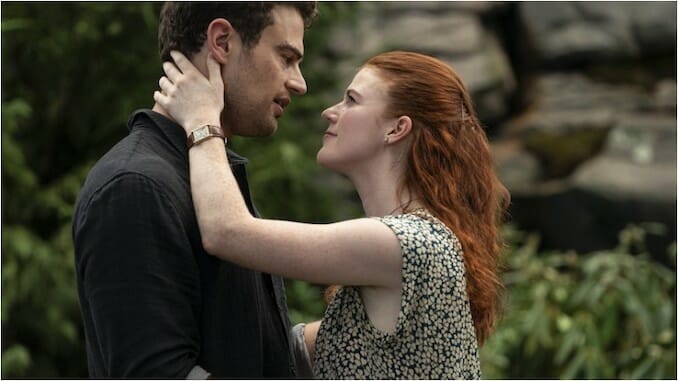HBO’s The Time Traveler’s Wife Is a Steven Moffat Joint Through and Through
Photo: Courtesy of HBO
Audrey Niffenegger’s 2003 novel The Time Traveler’s Wife was an instant bestseller, a cross-genre smash that combined popular elements of science fiction and romance to create something that felt as though it existed in a space all its own. Full of tortured romance, star-crossed characters, and a sensitive hero who just happened to spend a lot of time falling out of the sky naked, it’s a novel that is laser-targeted to appeal to the part of us that enjoys stories where love is often synonymous with pain. (Look, I also love Romeo and Juliet as much as the next person with multiple English degrees, but it messed me up when it came to understanding what a healthy relationship was supposed to look like.)
Nearly two decades after Niffenegger’s novel dominated the bestseller list, a prestige television adaptation is arriving on HBO, landing smack in the middle of broader cultural conversations about female agency, autonomy, and duty. Will audiences still swoon for its story of destiny, soulmates, and ride-or-die romantic loyalty, even when your partner doesn’t necessarily seem worthy of that sort of devotion? Or have we grown tired of love stories based on unspoken power imbalances and tragedy disguised as aspiration? Is the answer somewhere in the middle? I genuinely don’t know. (And I say that as someone who loved the book when it was first released! Growing up is hard!)
The Time Traveler’s Wife, in its broadest strokes, follows Henry DeTamble (Theo James), a man whose unique genetic disorder means he often comes unstuck in time, falling through to different points in the past or future. He usually (but not always) sticks to traveling in the years in which he is alive, and often manages to interact with himself along the way. But he cannot choose when these “attacks” of time travel happen or where he will go when they do, and though he eventually makes it back to the place he first left, he also cannot control how long that journey takes.
Clare Abshire (Rose Leslie) has grown up knowing—and loving—Henry, since he’s been time traveling to visit her since she was six. (She told everyone he was her imaginary friend.) When they meet as adults in their 20s, she’s thrilled to see him again, but he doesn’t know who she is—since, for him, his visits to the clearing behind her house are still in his future (even though they are in her past.) She also knows they’ll be married one day, as well as plenty of other snippets about how other aspects of their lives have turned out despite none of them having happened for her yet, and if this all gives you a headache, well, trust that you aren’t alone.
The six-episode series comes from Steven Moffat, who is probably best known for his time as the showrunner of Doctor Who and Sherlock, and if you’ve watched almost any of his work there, The Time Traveler’s Wife is going to feel deeply familiar to you, regardless of whether you’ve read the book the show is based on. After all, Moffat loves nothing so much as a love story told out of sequence—unless it is a ridiculously complicated puzzle-box mystery, or perhaps a young woman who imprints on a man at an impossibly early age and forms her life and personality around her feelings for him. This story is basically his World Series, is what I’m saying.
And, as such, it’s an almost perfect storm of everything that’s both great and terrible about Moffat as a storyteller.
On the surface, this is a story that feels sweepingly, achingly romantic; an ode to fate and destiny that says we end up with the person we’re meant to be with despite our best efforts to the contrary, and which insists our choices are ultimately our own, but also the decisions we were always going to make. Henry and Clare’s determination to be together, across years and lifetimes, is intense and magical, and Leslie and James certainly have smoldering chemistry together. The deft way the series weaves various elements of Henry’s life in and around one another is well done (some of the show’s best scenes are when Henry shares screentime with multiple versions of himself), and the videographer interview framework allows us to get some sense of the toll living this way inevitably takes on both parties.
-

-

-

-

-

-

-

-

-

-

-

-

-

-

-

-

-

-

-

-

-

-

-

-

-

-

-

-

-

-

-

-

-

-

-

-

-

-

-

-








































